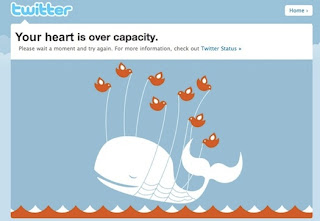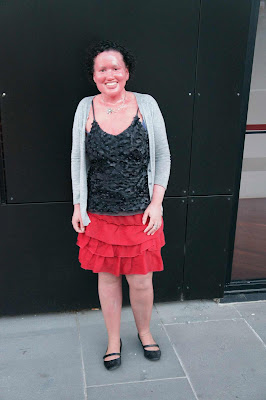(source)
When
I started writing this blog, I didn’t forsee how far it’d take me.
I have scheduled this blog entry to automatically publish when I am on the
plane to Canberra. I’m in Canberra to talk about blogging. For a work
related event. This is the first time blogging and my day job has collided. (I’ve
also realised that finally, my e-commerce degree has relevance, almost 10 years
after its completion!) I’ve had some pretty big personal achievements
through my blog, but this one is quite special, because my colleagues and
management have recognised me as a blogger.
I
don’t write about my day job here. This blog is my space to write free
from editorial constraints and the inevitable hierarchy that lies in an organisation.
You don’t really want to read about my day job anyway. While I enjoy it
and find it exciting (most days) it wouldn’t make for interesting
reading, and besides, I can’t divulge information about my workplace in
such a public forum. But each time I write here, and even though my day job and
blog content is so far removed, I have my day job in the back of my mind. What will my boss and colleagues think of my inner
most thoughts? (And I know some of my colleagues read my blog.) Have I represented my employer well? Why can’t
I rant about the frustrating phone call I had at work? Am I able to post the
picture I had taken with a celebrity who I met at a work event? Can I write
about the need for the government to provide better support to people with
disabilities?
The
Australian Public Service Commission has guidelines about
employees making public comment and participating online – in both
official and unofficial capacities. While I am always myself on this blog, I
still censor myself, being mindful of the values and code of conduct that I
need to follow as a government employee.
This
guideline document states:
“In
May 2010 the Government provided its response to the Final Report of the Gov
2.0 Taskforce, Engage: Getting on with Government 2.0. The Government
agreed to the report’s central recommendation—a ‘declaration
of open government’—which stated, in part:
online engagement by public servants, involving robust
professional discussion as part of their duties or as private citizens,
benefits their agencies, their professional development, those with whom they
are engaged and the Australian public. This engagement should be enabled and
encouraged.”
And
this is good news! It reinforces that as a blogger, I can have my own views and
opinions, and participating online is
good for my professional development. Colleagues often come to me asking for
social media advice, knowing that I use it so much outside of work.
“What’s the difference between a blog and a forum? How do we use
Twitter internally?” It’s nice to be acknowledged, and to know that
social media is now regarded as more than just Farmville and (un)tagging
drunken photos.
I
have given some thought to how to be a responsible blogger/social media user
and employee. I don’t think it’s exactly the same as the proper use
of IT guidelines enforced within the workplace – there is bound to be
more control over what you do on the internet during work hours and with work
resources. I believe the way you use social media outside the workplace is a
little more relaxed, but you still need to be mindful that your outside
behaviour may also impact or reflect on your workplace.
I
also think it’s a little like being a responsible blogger and hospital patient. I was discussing with my thesis supervisor that I have a dual
responsibility – to be a good public servant and to be a role model in
the chronic illness and disability community. This responsibility is there,
whether I choose it or not.
Here
are my top five tips for social media while being mindful of your workplace:
-
If you are putting your name and photo on your blog/Facebook/Twitter,
be accountable for your words and actions. Does it reflect you in your best
light? Does it reflect your organisation well?
-
Don’t criticise your employer or their
policies/products on social media. Conversely, don’t provide advice about
your employer’s policies and products – unless you’re their
social media spokesperson.
-
Get permission about who/what you’re blogging
about. Don’t name people or post their photos if they’re not
comfortable.
-
Show your organisation the benefits of social
media. Show them examples of how companies have embraced it and use it well.
Show them the way you use social media responsibly, and have achieved results.
Give them a reason to trust you and social media.
-
Have fun and be yourself. But be mindful of the
social media guidelines your organisation has set.
Wish
me luck for participating on the discussion panel. I hope to blog about it soon :)
How do you separate your work from your blog/social
media use?







.PNG)



.JPG)






